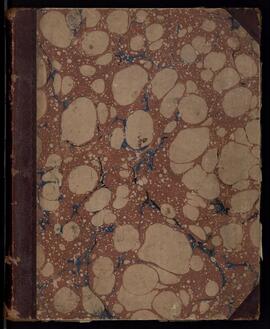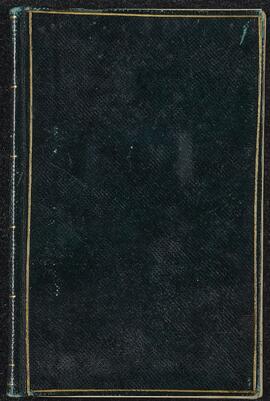Bound hardback volume containing a diary kept sporadically by Henry William Massy as a young man about town, describing his professional and leisure activities and containing introspective reflections of his own shortcomings. The diary provides a lively and betimes poignant account of the life of a young man eager to advance in life but not quite possessed of the maturity to fulfil his ambitions. It provides glimpses of urban life of the professional classes in 1830s and 1840s Ireland and challenges the perceived rigid morality of the Victorian era by revealing Massy’s long-standing clandestine affair with Maria Cahill.
The diary commences in February 1839 with regular entries describing the weather, Henry’s daily professional and leisure activities, the books he is reading, the parties he attends and the visits he pays to his mistress, Maria Cahill. He castigates himself for his habit of getting up too late in the mornings, usually as a consequence of too much merriment the night before, and for smoking cigars in his office. However, most of his diary entries are upbeat and humorous in tone. On 15 March 1839 he mentions meeting ‘Mrs James Sadleir, who asked me to subscribe to a Lying-in-Hospital, which they are getting up here – I said I did not think gentlemen had anything to do with it – she said she wished I could prove that, if so I ought to take out a patent’. His mother and siblings feature regularly on the pages of his diary, as does a destitute uncle for whom a subscription is arranged among relatives to provide for him: ‘altogether we will make up £70 a year but my uncle says it w[oul]d not keep him in potatoes & salt – How many curates live on £75 a year!’ There is a gap in the diary entries between 11 April 1839 and 19 October 1840, which Henry attributes to his lazy habits: ‘I am beginning to know myself pretty well and alas! I must confess the great fault in my character is irresolution of purpose and insuperable indolence.’ He confesses to having entered as a law student two years previously, ‘determined to read diligently… and I did keep my resolution excellently for – a week!! – since then I have done nothing’. An entry dated 23 October 1840 is followed by a blank page and a page torn out.
Henry resumes the diary in January 1841 with a description of preparations for a dinner party he is about to give and an account of the dinner party itself. He mentions his appointment to the Commission of the Peace for County Limerick and provides a lively account of a meeting he attends in Dublin on 21 January 1841 advocating the introduction of railroads in Ireland. He describes in some detail ‘Ireland’s great men’ who spoke at the meeting, including the Archbishop of Dublin, the Duke of Leinster, Earl Mountcashell, John O’Connell MP, Colonel Edward Michael Connolly, Christopher Fitzsimon MP, Henry Grattan and William Torrens McCullagh. He describes his daily activities in Dublin, which in the main consist of reading Sir Archibald Alison’s History of Europe in the Dublin Library, wining and dining at the Queen’s Inn and the Oyster Tavern, writing poetry and visiting his mistress. On one occasion, he spends half an hour walking with a Miss Millet, ‘a very agreeable girl and handsome by Candlelight’. Returning to Limerick in February, he takes great delight at the reception of some comic verse he has published anonymously. He attends the petty sessions in Limerick city as chairman for the first time ‘and went thro’ the business very well’. In March 1841, he contemplates his relationship with his mistress. ‘Poor Maria! I feel that I love her much and I know not how I can ever desert her – I have often been thinking latterly of retiring from the world with her, and taking a cottage in some retired country, of spending the rest of my days in quiet, giving myself up to my little children & my books…’ In the same month he mentions his election as president of the Mechanics’ Institute and discusses his plan to introduce a new system at the court house ‘By occasional levity and by inflicting an equal punishment on rich and poor’. He is suffering from an undisclosed ailment which is slow to heal and which leaves him ‘generally sad and out of temper’. In early April 1841 he travels to London and spends two weeks mostly dining at Lincolns Inn and visiting various theatres. Returning to Dublin, he notes: ‘I think I may in time become a useful magistrate and have a pretty fair knowledge of my duties as such – There are gentlemen on the Tipperary Bench of many years standing and, God knows! They know little enough’.
There is another long gap in entries between 2 May and 1 October 1841, when Henry describes a weekly meeting of Poor Law Guardians. An entry made on 3 October is incomplete as a consequence of a page having been torn out. The next and final entry is dated 1 January 1842, in which Henry reflects on the less flattering aspects of his character and his lack of application to qualify for the bar or to finish a story intended for publication in Blackwood’s Magazine. He also reprimands himself for the sorry state of his finances: ‘Every one, who spends more than his income, is a fool’. The entry ends abruptly with yet another torn-out page. Pagination up to page 55, but with irregularities.
Massy, Henry William (1816-1895), magistrate and justice of the peace
